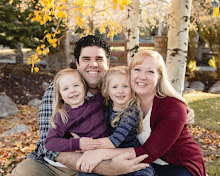When I think about Utah and environmental issues, I honestly can't think of much initially. I stretch my mind and memory and suddenly I can remember and think about the big things: the National Parks in southern Utah, Kennecott Copper Mine, the Great Salt Lake, proposed nuclear waste sites. I think of the winter months when an inversion in temperatures traps all the pollutants in the air and forces the inhabitants to breathe our own pollution, sometimes for a week at a time before the air clears out. When I consider issues closer to home, in Utah Valley, I start thinking about the air quality, the water quality of the Provo River, and the health of Utah Lake. I think about the fruit orchards that used to cover Orem and that are all but gone now. I think about the line of houses that creeps up the mountain sides, and the city lights that increase every year on the other side of the lake. I think about the Point of the Mountain, the arm of the Wasatch Mountain Range that divides the Salt Lake Valley from the Utah Valley, and the way it is slowly being carved away to make room for wider freeways and newer housing developments. The landscape it being adapted to fit the increasing needs of the growing population.
And yet, in spite of all these things I can think, I don't think about any of them on a regular basis, nor do I hear about them from other people or on the news. Environmental issues have never been at the forefront of the public mind here. It seems like individual issues come up and create a stir, but as a group, as a people, as a state, it isn't high on our agenda. At least, not here in Utah Valley. A better public transportation system is in the works, but so is a five-year project to widen and update the freeway. We have parks and "green spaces," but more and more land is being lost to development every year. There is a local Farmer's Market during the summer, but until recently I had never heard about it. My city's website has a list of ways to help the environment and my neighborhood just recently had a toxic waste pick-up, but the nearest full-service recycling center is in the next city. Though I'd guess that most people would agree that taking care of the environment is important, it doesn't seem like anyone is actively working toward doing that.
When I look online to find out what resources and programs there are in Orem, most of what I find relates to conserving and keeping our water clean. I am surprised at the focus until I remember particularly dry summers when we could only water our lawns a certain amount, trying to maximize every drop of moisture. I remember calling Utah Lake "the sludge pit" for years, even after the steel plant built on its banks had shut down. I remember learning in Elementary school to save water, even just by turning off the faucet when I was brushing my teeth. In a desert state such as Utah, it makes sense that the most vocal environmental concern would be about our water. The steel plant has been shut down for about eight years, but when the wind blows off the lake, it still smells like fishy garbage everywhere. I remember learning that before the plant was built, the city had to decide whether to build a steel plant or create a large marina, a tourist destination. The government decided to go with the jobs the steel plant would bring in, but more than half a century after that initial decision was made, we are left without the jobs and all the consequences of that choice.
And maybe that is the place to start, with the consequences. Water is not usually an abundant resource in this dry state, and it's clear what the consequences of polluting and using up our clean water source will be. There are opportunities to volunteer, to be active, but so much more needs to change for the general population: awareness and attitudes that lead to positive action, and the opportunity for change. I don't know whose shoulders that rests on. Probably all of us.
[Some of the information I found]
